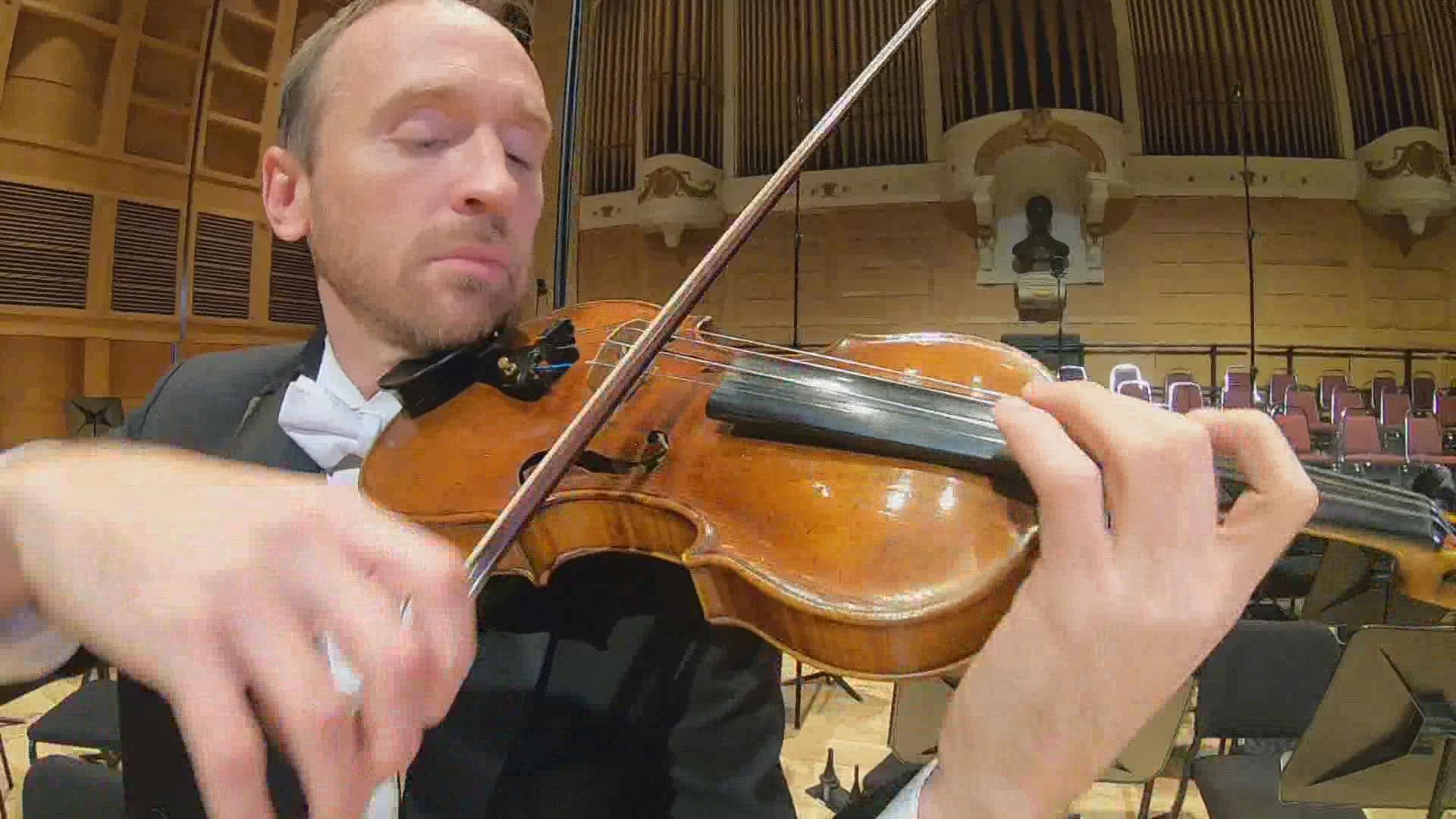PORTLAND, Maine — We all know the foreboding phrase: "Those who do not remember the past are condemned to repeat it." A worldwide exhibit that has been in Maine for the entire month of October is working to make sure that doesn't happen — through music.
Father and son violin-makers Amnon and Avshalom Weinstein founded and own the "Violins of Hope" collection. For two decades, they've restored dozens of instruments: violins, violas, and cellos — all of which are connected in some way to the Holocaust. The Weinsteins bring these instruments around the world, displaying them in museums and allowing local musicians to perform with them.
For Avshalom, the work is very personal. He said the Weinsteins lost about 400 family members in the Holocaust. His grandfather had 11 brothers and sisters. Avshalom said only his grandfather and one of his grandfather's brothers survived. He said he hopes these tangible artifacts help people have a better understanding of our world's dark past.
"I think this is something we have to make sure people remember because we see what’s going on around us, and some people didn’t really learn their lesson," Avshalom said.
Avshalom said many people don't realize how much of a role music played in the Holocaust. The Nazis generally took most of the nice instruments from Jewish people's homes, but they left the poorer-quality instruments. Jewish prisoners would then be asked to play those instruments at the concentration camps for a variety of reasons.
"The music was basically a way to deceive people that they came to a normal place — that they actually go to showers when they arrive to the camp to make them calm down," Avshalom said. "I mean, it was a way of torture, as well, to make the whole camp stand for hours in the rain and snow because the Nazis wanted to hear a piece of music."
Avshalom said prisoners would be asked to musically accompany other prisoners as the Nazis brought them to the gas chambers — and sometimes, that would include their own family members and friends. He said prisoners, however, would also use music for their own purposes, performing the sort of protest piece "Verdi's Requiem" multiple times in concentration camps.
Exposing this history is the goal of "Violins of Hope." During the last week of October, the Weinsteins are partnering with the Maine Jewish Museum and Portland Symphony Orchestra to allow Mainers to see the instruments up close and hear them being played. In fact, Portland Symphony Orchestra musicians are performing "Verdi's Requiem" at Merrill Auditorium this week.
"It’s almost like a 3D thing," Avshalom said about the way the work contextualizes history.
"I’ll say it. I’ve learned a lot about the Holocaust through this project," Charles Dimmick, the concertmaster for the "Violins of Hope" performances, said. "I had not known, for instance, that all of the concentration camps had orchestras. I had not known just how much the Nazis used music both as personal pleasure for themselves and punishment for the prisoners."
Dimmick said, for musicians, having a relationship with and understanding the instruments they're playing is important. He said that's the only way to allow the instrument's authentic "voice" to appear.
"I have this very short window of time where I can let this violin sing in the way it wants to," Dimmick said, noting he has only been working with this instrument for a week or so. "I feel a sense of obligation to do that to the best of my ability."
For Dimmick, it's also a way to think about and remember what happened decades ago.
"I think most of us go most of our year happily having forgotten," Dimmick said about the Holocaust. "To spend a couple of weeks so deeply in that history has been, at least for me, very moving."
Dawn LaRochelle is the executive director of the Maine Jewish Museum, where 30 of the 50 violins are on display this week. She said much of her family history was erased during the Holocaust. It's why educating people about the tragedy is important to her.
"Fewer and fewer people have direct knowledge about the Holocaust, and more and more conspiracy falsehoods are abounding in mainstream and social media," LaRochelle said, later adding, "There are many Mainers who do not know that much about Judaism and many more who have never even met a Jew."
LaRochelle said she believes the "Violins of Hope" mission is an effective way to help people learn and gain more compassion and understanding for others, noting music is the "great equalizer."
"Museum art is not just about static objects that you look at behind the glass. [It's] about the stories behind them," LaRochelle said.
The Maine Jewish Museum is open from 12 p.m. - 4 p.m. every day except for Saturdays. The "Violins of Hope" will be on display through Thursday. The Portland Symphony Orchestra has one more "Verdi's Requiem" performance on Oct. 25 at 7:30 p.m.

